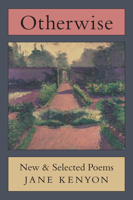The Meter Reader: Otherwise: An Appreciation
Donovan McAbee

Reviewed: Otherwise by Jane Kenyon (Graywolf Press, 1996).
At this moment in our shared life, when the common currency of our language has become debased, we each need authors who remind us of the power, beauty, and truth-telling possibilities of the well-chosen word, of the expertly-crafted image. For me, one of those authors is Jane Kenyon, and the first book of hers that I encountered was Otherwise, a collection of New and Selected Poems, posthumously published by Graywolf Press in 1996, one year after Kenyon’s death.
As with most of the best parts of my life, I was late to the party with Kenyon’s work, reading her first in a graduate class in 2002. In my early 20s at the time, I was still falling through the terminal diagnosis of melanoma that my mama had recently received. Kenyon’s meditations on suffering, her wrestling with God, her hard-earned tenacity in embracing beauty in the face of certain death, gave me a language for my own depression and grief. Her work gave me the insight and wisdom required to set one foot in front of the other and refuse to yield to despair.
In the title poem of the collection, certainly one of Kenyon’s most enduring and loved poems, the speaker reflects on the simple joys found in the minutia of the everyday and of the ways in which these mundane pleasures will one day cease. The poem opens, “I got out of bed / on two strong legs. / It might have been otherwise.” “Otherwise” then continues by listing this particular day’s gifts, with each assertion followed by the haunting refrain, “it might have been otherwise.” In the final lines of the poem, the speaker asserts, even more disconcertingly, that “one day, I know, / it will be otherwise.” In the space of the poem, the tensions of joy and the shadow of grief are held together, the certainty of each balanced by the presence of its own undoing.
In an interview with David Bradt, Kenyon once described the poet’s vocation as this: “to be a fearless finder of the names of things.” Throughout Otherwise, we see Kenyon living out this calling, finding the names and the metaphors, the similes and the images—nurturing a poetic body of work that reminds us of the vitality and beauty of language. In my own sorrow in the years that followed my mama’s diagnosis, and in the face of a grief that threatened to undo me, Kenyon’s words were strong medicine. Her work is for us now a testimony and a challenge, to honor the possibilities of beauty and solace, of the power of language to participate in the nurturing of community, in the binding of wounds.
Donovan McAbee's poems have appeared or are soon to appear in The Sun, Five Points,The Greensboro Review, and a variety of other journals. He was a 2018 Tennessee Williams Scholar at the Sewanee Writers’ Conference. He works as Associate Professor of Religion and the Arts at Belmont University, and lives in Nashville, Tennessee with his wife and toddler son.